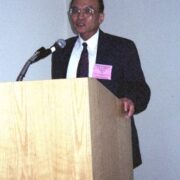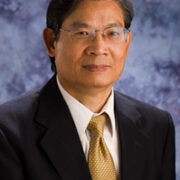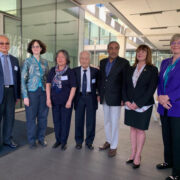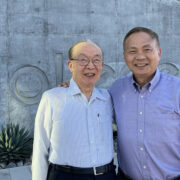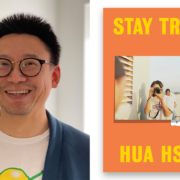一九六三年離台留美記
作者:劉兆民
一九六三年三月初的一天,我覺得我是世界上最幸運的一個人了。那天,我收到美國Wisconsin大學生物化學系系主任Robert H. Burris博士寄來的一封信,通知我該系的Marvin J Johnson教授已答應收我當他的研究生,並給我每年二四○○美元的研究助理獎學金,我收到這封信時的興奮與歡喜,實無法以筆墨來形容。我打開信一讀再讀惟恐看錯!因為這是唯一能夠讓我離開台灣出國,到美國免費念書,又有每月二○○美元的薪水的憑據!我每次回想起來還是難於相信,就這麼一張簡單兩三行的信竟能改變了我的一生! 渴望離台看自由世界 蔣介石獨裁國民黨專制統治下的五○、六○年代台灣,政治黑暗,經濟蕭條,社會閉鎖是生活在台灣有思想的知識份子及大學生最徬徨、最苦悶的時代。他們唯一的解脫是藉留學離開台灣。想盡辦法出國,尤其是留學美國是大學生的夢寐以求的理想。但出國談何容易?貧窮落伍的經濟狀況,即使思想沒問題,出國旅行只是極少數人的特權。那時大學畢業生月薪大約只有一○○○元台幣(廿五美元),一張台北到舊金山的單程機票卻要一萬多台幣,絕大多數的家庭為了維持起碼生計已相當掙扎,有能力送子女出國自費留學的也就寥寥無幾了。 我從大學及研究所畢業加上一年多不情願的預備軍官訓練與服役後,眼看一些同學,就職的已就職,能出國的出去了(我念研究所遲了兩年離校),回頭看我自己,不合興趣的工作既不願將就,我找不到自己理想的工作,內心非常納悶。因此也常想到離開台灣出國進修一途。但是出國的機會實在太渺茫了。家人既無經濟能力供我自費留學,以我平平學業成績能夠申請到國外大學獎學金的機會也少之又少。出國的願望也只是做白日夢罷了。 一九六 一年夏服完兵役後,我到台北打聽就職機會。有一天在台灣大學一號館走廊偶然碰到應用微生物學研究室的王西華教授。我與王教授本來不很熟悉,也沒上過他的 課。他只知我是日籍教授松本巍先生的研究生,過去見面時也只有點點頭頭而已。王先生看了我以為我已回校做事。我告訴他,剛當完兵打算出國進修,但需要在台 北找一份工作,並碰碰運氣申請美國大學研究所入學以及獎學金。很巧的是王教授正有個短期研究計畫,需要有研究經驗的研究助理。他知道我在松本教授門下做碩 士論文,因此提議何不到他的研究室工作?臨時工的工資雖少得可憐,月薪八○○台幣(二○美元),但准我睡在實驗室節省在外租屋(每月至少五○○台幣)之開銷。我想回到熟悉的學校,雖然只是臨時工作,總比無事閒蕩在家好。何況要申請國外大學獎學金,留在大學內一切都較方便,因此對王教授的提議毫不遲疑地馬上接受下來。 微生物學是現今熱門的生物工程學(Biotechnology)的基礎學科,王教授的研究題目果然引起我很大的興趣。我進了他的研究室有如魚得水,雖薪水微薄卻樂此不疲。我發現實驗研究有如玩美術工藝是很適合我的興趣與個性的工作。 我起居 工作都在研究室是不得已的安排,但卻給我不少好處。多年住在大學宿舍以及當兵時的流動生活經驗,我早已習慣隨遇而安吃住隨便的簡陋生活。因此晚上睡在以實 驗台當睡舖的硬板床上照樣入睡。王教授習慣於每早七點半到研究室。他來研究室之前,我得先把實驗台恢復原狀。我每天的工作,除了做自已的實驗也協助研究生 做論文,整理研究室以及處理一些文書雜事。。我就近在校門口羅斯福路旁的小吃攤搭伙食晚上利用實驗室打字機寫信申請國外大學獎學金,或閱讀研究文獻,複習一些基本學科,不然就是自修英文。無聊的時候,就和住在一號館值夜室的退伍老兵工友為伍聊天解悶。 王教授是位關心學生極願意替學生著想、幫忙的一位年輕教授。是台大教授中能夠在校 外拿到研究計畫充實他的研究室,用心做科學研究的少數教授之一。他是當時科技落伍,研究風氣不振的台灣學術界難得的學者。一九六二年初夏,我在王教授的研 究室已有一年。有一天他告訴我研究計畫經費有限,我也應該有個收入較好的工作。正好剛成立不到三年的台北醫學院化學系有個講師的空缺,因此王先生極力推荐 我接受這份工作,同時讓我繼續駐留在他的實驗室幫他做研究。如此安排,一方面是如果留學不成,也有個比較固定的工作。另一方面繼續居留在他的研究室,可免 出外租屋,節省開支藉此機會儲蓄,以備出國機會到時之旅費。上蒼不負有心人。一九六三年初我的機會終於來臨。當Wisconsin大學生化系有研究獎學金名額時,王教授毫不遲疑地推荐我到 Marvin Johnson教授門下進修。 當時,如果沒有王先生在関鍵時刻幫我按排推薦,我不可能有今天在美國寫這篇回憶錄。王先生是我人生歷程中影響我前途最大的一位教授。 一九六○年初台灣的學子們,拜受美、蘇兩國冷戰之賜,陸續有機會到新大陸留學,我是這群時代的幸運兒之一。韓戰之後數年,蘇聯首先把人造衛星Sputnik及太空人蓋加林 (Yuri Gargarin)送上太空,並在核子武器與飛彈科技之進展,大有凌駕美國之勢。為了對付蘇聯的科技挑戰,美國不得不急起直追,撥下大量科技研發經費,推動科科教育與研究, 並以研究獎助金吸收國外 科技人才加速研發的效率與成果。正逢其時苦無出路的台灣學子們,尤其是理工學生相繼得到美國大學獎學金的資助到美進修,並加入美國科技研發的行列,造成了 未曾有的台灣人留美熱潮。現在回想起來,我們這一批拿美國研究獎學金留學美國的台灣人,何嘗不就是美國學術研究機構雇用的廉價外勞? Wisconsin大 學獎學金的通知的確給我興奮了好幾天,但沒有高興多久。親戚朋友們的恭賀反而增加了我的心理負擔。出國心切加重我的擔心憂慮,惟恐萬一出不了台灣,失去這 千載難逢的機會將遺憾終身。我的顧慮並非杞人憂天。白色恐怖戒嚴的年代,台灣的住民沒有離台出境的自由。台灣省警備總司令部控制台灣人的一舉一動,隨時可以任何理由拒發出境證。我一位黃姓同學準備留學前向警備總部申請出境時,遲遲拿不到出境證。他從未參與任何政治活動或表達反政府言論,只是在服役時曾有一次與職業軍人有過爭議而可能因此被誣告。我早想離台,在軍中服役時非常謹慎言行,免得因小失大,但在這關鍵時刻仍是放心不下。所幸出境證申請無事過關,踏出了出國的第一步。 我高興的到外交部申請出國護照時,很巧,為我辦理護照的人是多年沒見面的中學時代學長陳安瀾兄。他告訴我,他在初中時候就因捲入反政府運動的漩渦裡早被政府列入黑名單,現在外交部護照科當雇員,天天替人辦出國護照,自己卻不能離台一步。他的無奈表情,我至今還是難以忘懷。 解決了出境問題,接著是準備美國入境簽證。當時台灣還是落後地區國家,被認為是肺病、砂眼、天花、霍亂的疫區。從台灣到美國的人須有免疫種痘以及肺部X光照片,證明本人是非帶菌者才准進入美國境內。留美學生另須通過英文能力水準測驗。 八月中旬,我把必備的證件文書備妥,到台北美國大使館簽證。之前,我除了自修之外,還上了八個星期美國新聞處開辦的美國歷史及美語會話課程,到大使館應試時 勉強通過了筆試,但口試就難倒了我。受理申請的口試員是新加坡華裔美籍職員。我的英文聽講能力委實差勁,加上他的口音一點也不像課上聽到的美語,我在緊張 的時候更無法和他應對。他考了幾句後,認定我的英文需要再加強後再回來簽證。帶著一肚子氣與失望,我走出了大使館門,非常沮喪不知如何是好。學期即將開 始,我再也沒有時間補習口語英文,何況再做短期惡補也不可能有所補益。我在街上徘徊,不覺走到漢口街,小學同學何秋生君工作的進出口公司門口。我等不及馬 上進去找他傾吐我的苦衷與失望。世間的巧事也真難以意料,我的同學竟和這位使館職員頗有交往。他提議當晚立刻同我到該職員自宅登門說項替我解困。做生意人的人際關係果然很有效力,我們拜訪他的隔天,簽證也很快的下來。如果沒有何君的及時幫忙,我的出國也不會那麼順利。當我拿著簽證的護照離開使館走上大街時,街上的人好像都以羨慕的眼光向我注目。 我拿到美國大使館 簽証後隔日, 馬上到中華路買了一個旅行箱, 到日本航空 訂了出國機票。我在台北兩年省吃儉用剩下來的錢剛好足夠買了一張台北到舊金山單程機票。為了旅途的閞支以及到了美國的第一月的生活費,我向己在加州大學留學的同學頼明堂兄貸款$200美金,準備上路。 從台北到舊金山 我離開台灣的大日子是炎熱的一九六三年九月二日,父母親、二姊,以及同學朋友外,有王西華教授、陳其昌教授,癒我砂眼病的陳聯滄醫師到台北松山機場送行。我託運的一件行李以及隨身的手提箱都裝滿了撕去了的書皮,被出境檢查員蓋有“僅供自用”的海盜版(Pirate book)英文教科書、字典以及參考書籍。因為行李裝了太多書籍,我只好把一套冬天西裝穿在身上上路。那天下午悶熱異常,我穿著不合時季的冬衣汗流浹背,卻一點也沒感覺到天氣的酷熱。當時的我真是憂喜交集,每想到此行是人生的轉捩點即將離開父母、故鄉、親朋前往人地生疏的異國生活,前途末卜,不禁憂心忡忡。好在多年來想要離開台灣看看自由世界的夢想,就將實現的興奮暫時克服了我的膽怯與憂慮。 四十年前的飛機無法直接橫渡太平洋,我搭的日本航空波音八八○噴射客機先在東京過夜,隔日再飛夏威夷(Hawaii)停留入境後,續飛洛山磯(LosAngeles)在此再轉美國國內線飛到舊金山。 我在東京停留時幸虧有留日同學陳元生君的嚮導,得以暢遊東京,並順道購買有生以來就很想擁有的奢侈品,Sony晶體收音機(廿四美元)及照像機(Olympus PenD,三○美元)。日本在二次大戰時被美軍徹底摧毀。日本人戰後受苦的程度,遠比台灣人為甚。但戰後十八年,我看到的是民主繁榮的日本。日本的成就正和獨裁專制統治造成的貧窮落後的台灣成了強烈的對比。 我第一 次踏上新大陸土地是一九六三年九月四日在舊金山下飛機,走在市街上的時候。那天秋高氣爽,迎面吹來的清涼海風新鮮無比。我走在街上環顧四週看不到一個警察 或阿兵哥,排在眼前的是高樓大廈整潔的街道,來去有序的交通行車,以及衣著鮮艷人高馬大的各色人種。我有如剛跳出古井的青蛙,所見一切不但新奇,更感嘆人 家生活水準之高,與台灣相比簡直有天壤之別,美國公民何其有幸得天獨厚,生活在這地大物博,自由民主繁榮的國度! 緊張出洋相的第一學期 我到Wisconsin大學生化系Johnson教授研究室報到是坐了三天三夜的灰狗巴士(Greyhound Bus),從舊金山到Wisconsin大學所在地麥迪遜(Madison,Wisconsin)城的第二天。我走進研究室時剛好沒人在,正在左右探望之際忽然一位穿黑咖啡色短袖襯衫,深藍色長褲的中老年人走進來。我趨前請問Johnson教授是否在校?這位仁兄卻用手指他的胸前回答 “我是Dr.Johnson”,我真不敢相信站在我的面前像個打掃工的人竟是我的指導教授!在慌張錯愕之下,我下意識裡覺得不應以貌取人把大教授看做清道夫,因此開口就說“I am sorry”表示歉意。Johnson教授聽了反瞪著我以莫名其妙的表情回我一句“What sorry for?”我開始緊張起來,我不敢也不知道如何以英語解釋我說Sorry的原因,只呆站在他面前不知所措。那時候在台灣學的英語會話一點也不管用了,連最起碼的自我介紹及寒暄應對的例句也都忘的一乾二淨! 我和指導教授的正式座談更是尷尬。我們一進他的小小辦公室,他立即問我在王教授的實驗室做些什麼工作?我好不容易用支離破碎的英語說明我的研究題目,並提到用細菌與糖蜜生產味精的試驗。Johnson大概聽了半天也沒聽懂我的說明,在我提到molasses(糖蜜)時立即反問 “What kind of molasses?我只知道糖蜜和蔗糖有關,卻不知道它的來源成分。對著突然而來的考問無法作答。後來我才知道糖蜜有兩種,甘蔗得來的糖蜜與用甜菜製糖的糖蜜。 Johnson教授是直接了當,不講廢話,很急性的人。他一針見血簡單的考問, 立刻看出我commonsense(一般常識)的程度。他聽我結結吧吧不成話句的英語,又是一問三不知的回應,開始顯出他的不耐。也許他心裡在嘀咕:“不要再浪費我的時間了”。我們只坐下不到五分鐘他已按捺不住,突然他站起來不說一聲就走出他的辦公室。之後,有好幾個星期,我雖然每天都和他碰頭,他再也沒有問過一句話。我在指導教授前一開始令人失望的表現,除了問心有愧也非常憂慮,這時候真是悔不當初來美之前沒有好好在口語英文下功夫,做學問時不求甚解,得來今天尷尬難堪的下場。 開學後近一個月的九月底,Madison已很寒冷,一天我上完了課回到研究室坐位,把冬天外衣掛在椅背上。Johnson教授正好走過我的旁邊, 問我 “Don’t you have a locker?”(你沒有壁衣櫃嗎)我聽不懂他的話,只發呆等他解釋。突然,他一聲不響抓著我的外套就很快地走出實驗室。他的舉動嚇了我一跳。我不了解他怎麼要把我的外套拿走?我緊跟他後面走,他急走到有Locker的地方手還拿著我的外套說 “This is a Locker”!! 我從來沒有用過Locker,也不知道Locker這個字,我還以為他在問我有沒有Rocker(搖椅)。我如果當教授收了一個像我這樣的學生,每次交談有如雞同鴨講,我也會為之氣結! 十月底的一個星期日早上,我照例到研究室。平常星期日早上都有學生在場的研究室連一個人影也沒有,只有Johnson教授已在他的角落工作。他一看我進來,馬上走到我的坐位旁。我預感到我大概又是做了什麼不對的事,他才會來找我,但又想不出有什麼問題。他一到我的面前不吭一聲就拉起我的左手臂看我的錶,然後指著壁上的掛鐘,示意我對照我錶上的時間與壁鐘的時間。我恍然大悟為什麼今早沒有學生來實驗室,原來我的手錶快了一個小時!我初來美國時最顧慮的是學業跟不上而失去在美生活唯一的依靠──獎學金。因此每天除了吃睡之外時間都用在書本課業。不看電視、不讀報紙,連日本買來的收音機也沒有派上用場。外面發生了什麼事一概不知,美國有日光節約時間的調整,當然也無從知道,本來可以多睡一個小時的那天竟一大早就趕到實驗室,真是出盡洋相! 一九六三年學期已過了大半,有一天坐在我對面的研究生 (David Pruess)告訴我John Garver教授急著找我。Dr.Garver講授「生物化學實驗」是研究生必修科。我趕緊到他的研究室。他說,他正在評閱考卷卻找不到我的。他以為我的指導教授或者我本人拿走了考卷。我只記得我們有過幾次小考沒有大考,何來考卷?原來他說的是學期開始時的考試卷。這更叫我墜入五里霧中,學期已過了大半,我竟一點也不知道有這回事! 「生物化學實驗」是每週三小時的實驗課。開學的第一堂學生到教學實驗室領取實驗藥品及儀器。Garver教授在大家收拾好了之後簡單介紹了課程內容。他特別的含糊口音,我大半聽不懂,我自忖實驗課自己看書做實驗也能應付,也不很注意他的講解。他講完了之後,我看左右的人個個開始離開實驗室,就以為今天就這樣提早結束,也就獨自回宿舍睡難得的午覺。其實那天,大家離開實驗室之前,Garver教授宣布大家移到另一教室,他要先給學生來個考試了解學生的程度。那時我卻沒有聴憧他的話就就離開了。學課沒有開始之前就先要考試,更是我萬萬預料不到的。 Dr Garver給人的印象是不易親近,其實他對學生非常寬厚。他的缺點是做事雜亂無章, 桌上亂七八糟,這是我兩年後當了他的助教時才知道的。我的推想是他在學期第一日考了學生之後,把考卷堆積桌上,過了大半學期後才發現還沒有閱卷評分,也在那個時候才發現沒有我的考卷。我看事態嚴重,很憂慮緊張地告訴他當時沒有應考的原因,並請求給我重考。他的回答是:「未開課前的考試,是要知道學生的程度,你是Johnson的學生,不必重考了。」他大概看Johnson教授的面子,給我手下留情。 Johnson是我們系內最難對付的怪傑。教授們敬佩他的才能與科學研究的態度,但是他的個性委實令人敬畏三分。生化系的研究生最怕Johnson教授是他們畢業論文的典試委員之一,因為他的口試問題總是出人意料的難,但答案都是我們應知的簡單常識。我們在他直接指導下的研究生有個好處就是我們經常會被他考問,到了最後論文口試時,他也懶得再問我們了。 Johnson教授一生奉獻科學研究與教學,每天早上七:三○分就開始他的研究工作,下午五:三○離開,和學生一樣佔一個實驗台做他自己的實驗研究,週末也不例外,只有星期日工作半天。他在生物化學工程學領域的研究成就,可從他死後美國化學會每年年會設有 Marvin J Johnson Lectureship (Johnson教授講座獎)看出他在這方面的貢獻。他的研究生來自不同領域,不管你是化學的、生物的、工程的背景,學生只要被他認為孺子可教就有機會留在他研究室做論文。在 他的研究室學生自己選擇自己喜歡做的題目,自訂進度,自己解決問題。我們很少去找他討論我們的研究問題。相反的他會隨時走到你的旁邊,提出問題徹底追究你 在做什麼,為什麼要這樣做。在日常的口問中,他掌握了每個學生的研究進度,同時了解學生的程度與能力,我們每天就這樣被考問中,無形中學到了做研究的態度 與方法。他只要確認學生自己了解自己在做什麼,就很放任。當時有個學生興之所至,在實驗室製造啤酒,Johnson教授一點也不介意,反而跟學生討論釀酒的科學,我還以為釀酒是他畢業論文的一部分。 我初到Johnson研究室時,因為拙於用英文表達,平常又不善辯論,對他突然而來的口頭考問最感棘手。當時,常有被他一問三不知,呆若木雞的窘態,現在回憶起來還是心有餘悸。我在Wisconsin大學生化系的第一學期過的實在很艱苦。除了指導教授難於應付之外,課業的負擔,擔心唸不下去失去獎學金的壓力一直牽掛在心。我本來主修是生物學,來到生化系念研究所感到特別吃力,尤其是上課時大部分都是鴨仔聽雷不知所云。為了應付作業、考試,我只有無瞑無日整天K書。我很少和洋同學接觸,在研究室大家忙於自己的工作,偶爾一起聊天時,我也聽不懂他們的Conversation更無法插嘴。我在Madison的生活只有兩個地方:宿舍與研究室,一大早帶著Sandwich,不是上課堂就是到實驗室。下午匆匆回來宿舍煮食簡單晚餐後,又回到研究室直到午夜時分才回來睡覺。每週七日“月月火水木金金”(曰語:二次大戰時日本訓練新兵的口號。一星期7天中有兩天的星期一,兩天的星期五,沒有週末休假日。)天天如此,沒有一日之閒。學課與研究工作雙管齊來的壓力真是艱苦無人知。我那來的耐力與意志竟能渡過這段日子,現在回想當時,真是難以置信。 一九六三年底,我已比較適應在Wisconsin大學的新環境,對課業也勉強能夠應付,只是在Johnson教授面前我仍不能自在,我的表現也大打折扣。他給我的無形壓力一直到聖誕節前幾日才稍為減輕。那天他告訴一位和我同時進來的研究生過節之後不必再回到研究室! 雖然這位新生的學科成績並不差,Johnson大概認定該生不是做研究的材料,請他走路。我正在擔心被判同樣的徒刑之際,他卻問我過了年之後計畫做什麼實驗,好像是說你不必緊張,繼續下去吧!我慶幸終於挨過了最關鍵的第一學期。 我第一次在美國過聖誕過新年時的輕鬆愉快, 自不在話下。
1963, THE YEAR I LEFT TAIWAN AND BEGAN MY SECOND LIFE IN AMERICA by Chao-Min Liu I felt like the luckiest person in Taiwan in early March, 1963. I had received a letter from Dr. Robert Burris, Chairman of the Department of Biochemistry, at the University of Wisconsin, Madison, which informed me that I was awarded a Research Assistantship of $2,400 /year for my graduate studies in biochemistry under the guidance of Professor Marvin J. Johnson . I had struggled for almost two years in vain to obtain admission with financial support from graduate schools in America. My joy from receiving the letter was beyond imagination. I re-read the letter repeatedly and could hardly believe that this simple one-paragraph letter meant so much to me. Indeed, it changed my life and my future forever. This letter allowed me to leave Taiwan. I could travel or stay anywhere in the United States, study at the University of Wisconsin tuition-free, and receive a monthly salary of $200.
- ANXIOUS TO LEAVE TAIWAN
To study abroad, especially in America, was a dream of every young college graduate in politically repressive Taiwan, which was under the totalitarian control of Chiang Kai -Shek’s KMT regime. Even if you were politically correct and permitted to leave Taiwan, only a very few could afford to make trips to other countries. Taiwan at that time was a very poor, under-developed, country. Hardly anyone could earn enough to make a living, not to mention support their sons or daughters to study broad. An airplane ticket from Taiwan to San Francisco cost about US$ 300, but the average salary for a college graduate in Taiwan was only around $25/month. Since there were no jobs of interest to me after my graduation from National Taiwan University (BS & MS), I was very depressed about my future prospects. Another year of obligatory (and unhappy) military service in the Nationalist Army further convinced me that to have a better future meant leaving Taiwan. However, the options for me were very limited. The only way out for me was to become a graduate student in a foreign country with financial aid. After completing military service in the summer of 1961, I went back to the university to visit friends there. One day while I was wandering in the building where the Dept. of Agriculture Chemistry was located, I accidentally bumped into Professor H.H. Wang, whom I knew, although I had never taken any of his classes . I told him that I just finished my military service and was looking for job with the intention of studying abroad in the future. Coincidentally, Professor Wang was looking for a person who could help him start his new research project. At the end of our conversation, which ended up being an impromptu job interview, he suggested that I worked for him temporarily in the Agricultural Chemistry Dept. while I tried my luck seeking financial support from an American university. Without hesitation, I followed his advice and accepted his offer right away. I started working in his lab a week later after visiting my parents in the country side. Since the salary he offered me was so meager ($20/month), I could not even afford to rent a room staying in the city (Taipei). His solution: to live and work in his lab. The two years of living and working in his lab were among the most intense days of my life. I worked all day long in the lab. In addition to carrying out research experiments, I served as his teaching assistant, secretary, lab manager and janitor. At night, I would clear up a lab bench of about 4’ x 8’ to serve as my bed. I woke up early each morning, removed my blanket and bed sheet and began my daily lab work on the same bench. Dr. Wang would start his work at 7:30 am, so I had to be ready before his arrival. I was very busy but was happy to have the opportunity to learn more about scientific research. After working in the lab for one year, Dr. Wang tried to improve my financial situation and suggested that I took a temporary teaching job available at Taipei Medical School but continued working part-time in his lab. My hard work and good performance convinced Dr. Wang that I could be a good scientist. Indeed, it was due to his strong recommendation that I was eventually awarded a scholarship from the University of Wisconsin in the spring of 1963. The availability of research scholarships in the US benefited hundreds of Taiwanese students who were eager to pursue their advanced training outside Taiwan during the 1960’s. I was lucky enough to be one of them. In retrospect, I should be grateful to the Soviet Union for its effort in putting Sputnik on earth orbit ahead of the United States. During the cold war era of the late 1950s and early 1960s, advances in Soviet’s nuclear science and missile technology posed a big threat to US security. In order for US to catch up and counter the challenge from Soviet Russia, President Kennedy and Congress allocated large amounts of funds to stimulate research in science and technology development and innovation. The outcome of cold war politics was the availability of grants and scholarships for foreign students in universities across the United States. My excitement on being awarded a scholarship from the University of Wisconsin did not last very long. Stories of the KMT government denying individuals their passports due to political incorrectness, bothered me immensely. Under the KMT’s “White Terror”, a citizen could not freely go abroad until one received clearance from Taiwan Garrison Command. In fact, the Garrison Command practically controlled everybody’s life in Taiwan. People were apprehensive of the fact that they could be watched or traced whenever and wherever they went. Congratulations from friends and family only intensified my anxiety that I may not be able to pursue my dream. My worry deepened the next several weeks when a classmate of mine was told by the Garrison Command that his application of passport would take extra time for them to process, which was a bureaucratic way of saying “no”. He suspected that he had been black-listed. He was a good citizen and was never involved in any political activities. The only thing that might have gotten him blacklisted was that he once offended a career military officer during his military service. Fortunately for me, I was able to secure my permit without any delay. When I handed over my documents for the passport application at the Ministry of Foreign Affairs, I was happy to see that Mr. Chen An-lan, a high school classmate senior to me, was the person handling my application. Before I left him, he told me that he envied people who had the opportunity to leave Taiwan since he would never be allowed to travel abroad as long as Taiwan was under the KMT regime. The reason: when he was a 15 year-old high school junior, he was involved in an anti-KMT activity and his name had been on the black list ever since. With passport in hand, the next hurdle was to pass the English test and visa application at the US Embassy in Taipei. To prepare for the test, I took courses in American History and English Conversation (sponsored by USIS in Taipei) and passed the comprehensive English Proficiency Test. My application for a visa was not without trouble though. The documents needed for a US visa application included the following: my passport, a chest X-ray film proving that I was free of tuberculosis, evidence of Tetanus, cholera, and measles vaccination, proof that I was free of Trachoma, which had infected my eyes, documents of financial support from a credible sponsor or a bank account in the US, and English test scores. I was positive that I met all the requirements to be granted a visa immediately, but this was not the case. The preliminary interview conducted by a clerk who handled student visas in the Embassy failed me for my poor understanding of spoken English. The denial of my visa was a big blow. I had less than a month to report to the University of Wisconsin in order to be eligible for the Graduate Assistantship and I could not afford to start all over again by taking lessons to improve my spoken English! I was totally dazed when I stepped out of the embassy gate. I aimlessly wandered the streets for a while, and was eager to find someone to share my disappointment and despair. I decided to visit my close friend Mr. C-S Ho, who happened to work for an Import/Export Firm near by the Embassy. To my great surprise, after explaining my desperate situation, Mr. Ho told me that he had done business with the very same Embassy clerk who had failed my visa application, and was quite friendly with him. He suggested that we go right away that night to the clerk’s home to plead my case. I was very uncomfortable with the idea of visiting a stranger privately to ask for a favor but at this critical time I really had no alternative. Mr. Ho, a businessman familiar with wheeling and dealing, figured that with their past business relationship, he could easily take care of my problem right away. To my great relief at the end of our visit, I was promised I would have my visa when I returned to the Embassy the next day. The next morning, it took less than 20 minutes to have my visa approved from the Embassy. As I walked out the embassy gate, I was elated that after overcoming all of these obstacles, my dream of leaving Taiwan would soon become a reality.
- FROM TAIPEI TO SAN FRANCISCO
I still vividly remember the day I took a Japan Airlines flight from Taipei to San Francisco. The big day was September 2, 1963. I boarded a Boeing 880 jet with my luggage and a large hand-bag packed with pirated copies of Chemistry and Bio-Chemistry textbooks. These pirated books, with front cover ripped off, and officially stamped with “for private use only” by custom officer, were allowed by U.S. Customs to bring into U.S. by poor students from Taiwan. My beloved parents, friends, along with Dr .L.C Chen (who took care of my Trachoma infected eye), Professor C. C. Chen, and Professor H.H Wang, all stood behind a wire fenced gate to plane runway as they sent me off. That day, the afternoon was sunny, hot and steamy with temperatures soaring over 90 degrees. I was formally dressed in a wool suit and tie for the occasion. It was the only suit I owned, which I had bought in preparation for the cold weather in Wisconsin. Sweat oozed all over my skin and soaked all of my clothes. Yet I did not feel a bit uncomfortable. Contradicting thoughts about my future totally occupied my mind. I was excited about the fact that I would soon be out of Taiwan to pursue my career in the United States. On the other hand, pessimistic thoughts began to creep into my mind over and over. What should I do if I failed in school and had my scholarship terminated? The fact that I would be on my own, and had nobody to turn to made me tremble. Fortunately, the excitement of being free to go abroad overcame my fear. My first flight in a jet plane was exciting. An over night stop in Tokyo gave me a chance to see the booming economy of Japan. Destroyed to ashes during WWII, Japan suffered far more than Taiwan right after the war. The Japanese I saw, however, enjoyed democratic and prosperous lives 15 years after the total destruction of Japan. For the first time, I realized how backward Taiwan was under the government of the KMT regime. During that short stay in Tokyo, I used some of the US dollars I had borrowed from a former classmate who was already a student at the University of California at Berkeley, to buy a Sony transistor radio and a pocket sized Olympus Pen D camera. I was quite comfortable in Tokyo because the people and the language were not strange to me. However, after the plane arrived in San Francisco, I began to feel homesick. The people, the land, and the food … were all different from the world I came from. My first impression of America was that everything was big: big buildings, big people (white and black), and big open spaces. It was a real eye-opener when I walked on the streets of San Francisco on a cool, breezy, sunny day of Sept 4, 1963.
- TENSE, NERVOUS, AND AN EMBARRASSING FIRST SEMESTER AT THE UNIVERSITY OF WISCONSIN
I reported to Professor Johnson in his lab at the Biochemistry Department a day after a 3-day Greyhound bus ride from San Francisco to Madison, Wisconsin on September 8, 1963. When I stepped into his lab, no one was there. Suddenly a man dressed in a dark coffee-colored, short-sleeved shirt with wrinkled, blue pants appeared. I approached him and asked for Dr. Johnson. To my surprise, the man replied with his finger and pointed to his chest, “I am Dr. Johnson.” In Taiwan, professors dressed formally in suits or sports jackets with ties. In front of me was a man who dressed like a janitor or a plumber! To apologize for my wrong conclusion about him based on his appearance, I instinctively said to him “I am sorry”. He was very puzzled by my strange way of starting the conversation. “Sorry for what?” was his answer. The stress made me forget all of the English I had learned and I could not utter another word of English. My first meeting with Professor Johnson in his office was a disaster. After the initial encounter, we stepped into his small office. Immediately he asked me what I had done in Dr. Wang’s lab. I was barely able to describe in broken English what I did and ended up mentioning that molasses was used in one of my experiments. He then asked what kind of molasses I was using. Since this was the first time I was interviewed by a strange, American professor in a language I hardly could follow, I was extremely nervous and tense. I could not say a word to answer his question. I was not aware of the differences between sugarcane molasses and sugar beet molasses: only sugarcane was grown in Taiwan. After I failed to respond to another question, he suddenly got up from his chair and walked away without saying a word. Professor Johnson was a straight-forward and a no-nonsense type of individual, but also very impatient. Our meeting lasted less than 5 minutes. I could tell what he was thinking in his mind, “you are wasting my time”. He apparently was very disappointed and upset with my poor English and ill-prepared scientific background. For several weeks, he did not speak to me. There is a saying: “A good start is the beginning of a future success.” My poor start made me very, very worried. I found out that Professor Johnson was notorious for being merciless towards students who were incompetent. The worst thing about me was my unsure English. Before I came to the US, he had already told me in a letter that the only thing to prepare for before coming to his lab was to improve my English-language skills. I put immense pressure upon myself as a result. Nightmares of being questioned by Marvin Johnson continued even after I graduated years later. The next embarrassing event with Dr. Johnson occurred in late September, when it was already winter in Madison, Wisconsin. One day after a class, I went back to my lab desk hung my heavy coat on the back of my chair. Professor Johnson happened to pass by and asked “Don’t you have a locker?” I did not know what “locker” means and just gave him a puzzled look. Suddenly, he grabbed my coat and walked out of the lab. His action surprised me. What had happened that made him taking my coat away? I immediately followed him. He rushed toward the hallway where the student lockers were located, and then said to me with his hand still holding the coat: “this is a locker!” In Taiwan, schools never had the luxury of providing lockers to students for their private belongings and I never heard of the word “locker” before. I thought he was saying “rocker”. What did my coat have to do with a rocker? On a Sunday morning in late October, I went to the lab as usual. Nobody was around but Professor Johnson. He was a workaholic and always in the lab, even on Saturdays and Sundays. He would always start his work at 7 30 a.m. When he saw me coming, he walked directly toward me. I sensed something was wrong with me again but could not figure out what it could be this time. Without saying a word he held up my left hand on which I wore my watch. He pointed his finger to my watch then pointed to the clock on the wall. Suddenly I realized that although my watch stated 8 a.m., the clock on the wall read 7 a.m. He smiled at me and then walked away to his work. When he saw me come so early that morning, he knew right away that I did not know anything about daylight-savings time. One more embarrassing event occurred during my first semester at the University of Wisconsin before 1963 was over. One day, more than half way through the semester, my lab-mate David Pruess told me that I had better see Professor John Garver right away. Professor Garver taught laboratory Biochemistry to the first year graduate students. David sounded very serious. I rushed to Dr. Garver’s office and discovered that he could not find my exam paper for my class. He was wondering if my advisor, Professor Johnson, had it or if I had taken the exam away from his desk. This was a very serious matter. But I was totally unaware of any exam given in Professor Garver’s class. It turned out, as a matter of fact, that he had given an exam on the very first day of class and I had missed it! As I recall, on the first day of his class, we were assembled in the departmental teaching lab. Every student was assigned a lab bench and given equipment and chemicals needed for the course. After we settled down, Dr. Garver gave a brief lecture. I could barely understand what he said. When he had finished, I looked around the class and saw everyone grabbing their notebooks and leaving the lab. When everybody walked away, I thought the class was over, and I was happy to have a short first class session. So I went back to my dormitory to take a nap. Actually, they were all heading to another classroom to take an exam given by Dr. Garver. I had missed the most important announcement of his class due to my poor understanding of spoken English. Professor Garver was a very nice person, but very disorganized. His desk was especially messy, which I learned two years later when I became his teaching assistant for the same course. He had forgotten to grade our exam papers until more than half way through the semester, and had probably thought he couldn’t find mine. I was so relieved when he told me, “Since you are Professor Johnson’s student, you do not have to take the exam again.” If I had taken the exam, I would have been unable to answer most of his questions and surely would have failed. I lucked out this time simply because Professor Johnson was my thesis advisor. He was a tough, top-notch scientist who was feared, but well respected by the graduate students as well as faculty members in the Biochemistry Department. He would drop by students’ sides in the middle of his or her lab work and ask, “What are you doing?” If we were not prepared to explain to him the scientific reasoning behind our work, we would be in trouble. On the lighter side of him, he would let his students do and explore anything they liked to do as long as what they did made scientific sense. One of his students brewed beer in the lab for his consumption. Johnson didn’t care a bit. He was happy to discuss the science behind the beer-making with the student. They would discuss it as if the student’s thesis work was on how to make good, tasty, beer. Students in his lab leaned a great deal of science from him, not only from his lectures but also through his thought-provoking questionings, which were about things we should have known but always forgot. Toward the end of 1963, I became more accustomed to my new life at UW which help me regained confidence in myself. On the day before Christmas recess, one of the new students in the lab was told by Johnson that he does not have to come back to the lab again next semester. Luckily for me, what Johnson asked me was about my next experiment in January . It gave me a great relief to know that Johnson finally accepted me as his student.
- EPILOGUE
It has been almost 50 years since I left Taiwan. It is hard to believe that I would end-up coming and living in the United States. When I was a young boy living in the country side in Taiwan, I was always dreaming of going somewhere someplace remote from my home. The stories of Robinson Cruse and Gulliver Travelling fascinated me. As I look back and reminisce about the eventful and exciting year of 1963 , I often wonder what kind life I would live if I had stayed in Taiwan. What if, etc.…. Such questions of course would never have an answer. However, one thing I can be sure is that I do not regret having decided, despite all the trouble I had to go through, to come and live in the United States. Only this country would give me the freedom and the opportunity to learn, to explore my interests in art and science and to satisfy my curiosity. These are the things I am sure I never would have had if I had stayed in Taiwan. (6/12/2002)
劉兆民 Chao-Min Liu, Ph.D. Fellow, American Academy of Microbiology 作者任職瑞西羅氏製藥公司生物工程研發部資深研究領導員 ( Distinguished research leader, Hoffmann-La Roche Inc. Nutley, N.J.07009 ), 2011年退休. 原文登於台灣文學評論 2003年, 3卷2期257一267頁。 2013年9月修訂
源自 劉兆民

